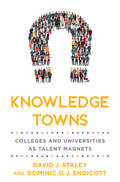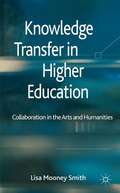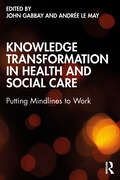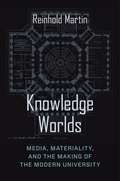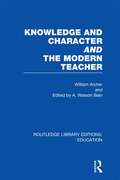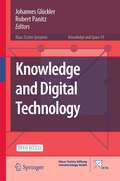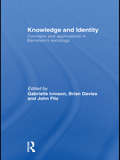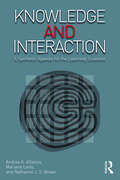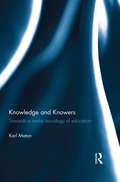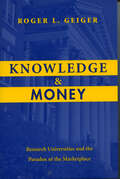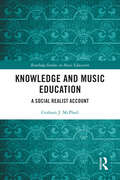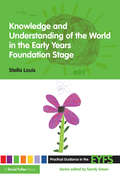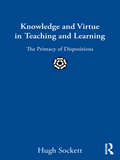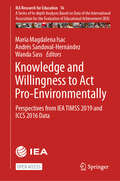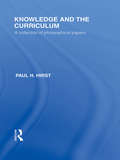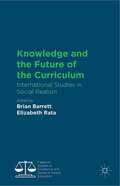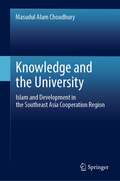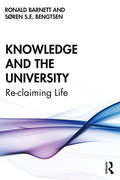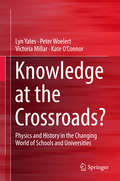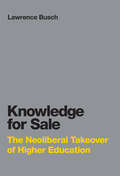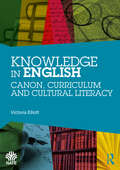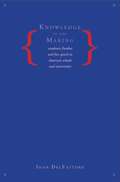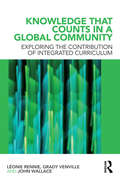- Table View
- List View
Knowledge Towns: Colleges and Universities as Talent Magnets (Higher Education and the City)
by David J. Staley Dominic D. EndicottThe remote work revolution presents a unique opportunity for higher education institutions to reinvent themselves and become talent magnets.In Knowledge Towns, David J. Staley and Dominic D. J. Endicott argue that the location of a college or university is a necessary piece of any region's effort to attract remote knowledge workers and accelerate economic development and creative placemaking. Just as every town expects a church, bank branch, post office, and coffeehouse, Staley and Endicott write, we will see a decentralized network of institutions of higher education flourish, acting as cornerstones for the post-pandemic rebuilding of our society and economy. In calling for a "college in any town," they are not simply proposing placing a traditional college within a town or city, but envisioning instead a particular kind of higher education institution called a "knowledge enterprise." In addition to providing the services of a traditional college, a knowledge enterprise acts as a talent magnet, attracting workers looking to move to cheaper and more attractive destinations.With the post-COVID-19 shift to more remote work, and millions of people moving to more affordable and livable cities, a place that wants to attract talent will require a thriving academic environment. This represents a new opportunity for "town and gown" to create collaborative communities. The pandemic has accelerated existing trends that put at risk the viability of many colleges and universities, as well as that of many towns and cities. The talent magnet strategy outlined in this book offers colleges and towns a plan of action for regeneration.
Knowledge Transfer in Higher Education
by Lisa Mooney SmithA presentation of four years of close observation of research and knowledge transfer practices in a university. It attempts to contextualise knowledge transfer within the arts and humanities, as well as situate learning about the reception and adoption of it by the individual scholar and the organisation in which they operate.
Knowledge Transformation in Health and Social Care: Putting Mindlines to Work
by Andrée Le May John GabbayThe term ‘mindlines’ has become common currency in the world of research implementation and evidence-based practice. This book updates, develops and applies the mindlines model more widely. It sheds light on how we can realistically mobilise and transform research-based evidence into practice in context. This illuminating book shows how the mindlines model can be put to work. It highlights how practitioners collectively share and internalise implicit, flexible ways of rapidly handling complex clinical situations. Drawing on research and reflective studies from practice, education, and guidelines-development across a wide range of international health and care settings, the authors unpack the general components of mindlines. They find practical ways to uncover, bring together and apply specific mindlines to improve practice; and to develop evidence-based healthcare policy, practice and education in ways that capitalise on the crucial role of mindlines. Closely edited by the originators of the mindlines model, this book brings together the work of a cohesive group of researchers and practitioners to showcase and develop its theory and consequences. It is an essential read for all those interested in knowledge mobilisation, evidence-based practice, and research implementation both within healthcare and beyond.
Knowledge Translation in Context
by Anne Marshall Bonnie Leadbeater Elizabeth M. BanisterThe main goal of knowledge translation (KT) is to ensure that diverse communities benefit from academic research results through improved social and health outcomes. But despite growing interest in researcher-user collaborations, little is known about what makes or breaks these types of relationships. Knowledge Translation in Context is an essential tool for researchers to learn how to be effective partners in the KT process.Drawing on expertise and studies from across the globe, Elizabeth Banister, Bonnie Leadbeater, and Anne Marshall outline a variety of perspectives on KT processes. Case studies outline the uses of KT in many contexts, including community, policy, Indigenous, and non-profit organizations. While recognizing the specificity of each situation, Knowledge Translation in Context highlights the most important elements that have led KT to succeed (or fail) as a dynamic, multidirectional process.
Knowledge Worlds: Media, Materiality, and the Making of the Modern University
by Reinhold MartinWhat do the technical practices, procedures, and systems that have shaped institutions of higher learning in the United States, from the Ivy League and women’s colleges to historically black colleges and land-grant universities, teach us about the production and distribution of knowledge? Addressing media theory, architectural history, and the history of academia, Knowledge Worlds reconceives the university as a media complex comprising a network of infrastructures and operations through which knowledge is made, conveyed, and withheld.Reinhold Martin argues that the material infrastructures of the modern university—the architecture of academic buildings, the configuration of seminar tables, the organization of campus plans—reveal the ways in which knowledge is created and reproduced in different kinds of institutions. He reconstructs changes in aesthetic strategies, pedagogical techniques, and political economy to show how the boundaries that govern higher education have shifted over the past two centuries. From colleges chartered as rights-bearing corporations to research universities conceived as knowledge factories, educating some has always depended upon excluding others. Knowledge Worlds shows how the division of intellectual labor was redrawn as new students entered, expertise circulated, science repurposed old myths, and humanists cultivated new forms of social and intellectual capital. Combining histories of architecture, technology, knowledge, and institutions into a critical media history, Martin traces the uneven movement in the academy from liberal to neoliberal reason.
Knowledge and Character bound with The Modern Teacher (Routledge Library Editions: Education)
by William ArcherWritten before, but published after The First World War, this volume’s plea for a national system of education which will produce a nation of prosperous, morally fulfilled people able to live at peace with other nations is doubly poignant given the sacrifice of the ‘lost generation’. However, the author also sees the horror of the War as an opportunity to change human destiny through education, an opportunity to abandon the narrow system of education in favour of one which will ‘bring education in touch with life’ and provide Britain with the intellectual and moral efficiency necessary to steer her through the following turbulent years of the twentieth century. Covering the core subjects of the English school curriculum in the early twentieth century the chapters in The Modern Teacher, if somewhat utopian, describe best practice in teaching of the particular subject and suggest possible improvements. One chapter also discusses the importance of the relatively new subject of citizenship, as well as the moral education of pupils.
Knowledge and Digital Technology (Knowledge and Space #19)
by Johannes Glückler Robert PanitzThis open access book explores the multifaceted interplay of technology, knowledge, and place. While digital technology is increasingly influencing our way of knowing, conversely it is itself the consequence of human creativity and local social interaction. Part I analyzes how digital technologies transform markets through artificial intelligence and decentralized blockchain models. Its contributions discuss novel governance mechanisms, including the responsible use and analysis of big data. Part II illustrates various ways in which technology supports humanity, be it algorithms supporting complex decision-making processes or the use of robotics in care services. The chapters highlight that technology's efficiency and potential rely on social norms and human capital. Finally, Part III shows that digitization is generating vibrant entrepreneurship, reflected in geographically clustered urban scale-up economies, as well as opening up new ways for people to connect with one another, organize civic engagement and enable new forms of labor. The book offers theoretical reflections as well as empirical cases from the United States, Canada, Japan, South Africa, and Europe. This volume provides a valuable read for scholars, students and professionals in the fields of knowledge creation, technology and governance.
Knowledge and Identity: Concepts and Applications in Bernstein's Sociology
by Gabrielle IvinsonWhat in the digital era is knowledge? Who has knowledge and whose knowledge has value? Postmodernism has introduced a relativist flavour into educational research such that big questions about the purposes of education have tended to be eclipsed by minutiae. Changes in economic and financial markets induce a sense that we are also experiencing an intellectual credit crunch. Societies can no longer afford to think about the role of education merely in relation to national markets and national citizenry. There is growing recognition that, once again, we need big thinking using big theoretical ideas in working on local problems of employability, sustainability and citizenship. Drawing on aspects of Bernstein’s work that have attracted an international following for many years, the international contributors to this book raise questions about knowledge production and subjectivity in times dominated by market forces, privatisation and new forms of state regulation. The book is divided into three sections: Part one extends Bernstein’s sociology of knowledge by revitalizing fundamental questions, such as: what is knowledge, how is it produced and what are its functions within education and society in late modernity? It demonstrates that big theory, like big science, provides immense resources for thinking ourselves out of crisis because, in contradistinction to micro theory, we are able to contemplate global transformations in ways which otherwise would remain unthinkable. Part two considers the new, hybrid forms of knowledge that are emerging in the gap opened up between economic markets and academic institutions across a range of countries. Bernstein said in the 1970s that schools cannot compensate for society but we might now ask: can universities compensate for the economy? Part three adds new conceptual tools to the understanding of subjectivity within Bernstein's sociology of knowledge and elaborates conceptual developments about pedagogic regulation, consciousness and embodiment. This book will appeal to sociologists, educationists and higher educators internationally and to students on sociology of education, curriculum and policy studies courses.
Knowledge and Interaction: A Synthetic Agenda for the Learning Sciences
by Andrea A. DiSessa Mariana Levin Nathaniel J.S. BrownDecades of research in the cognitive and learning sciences have led to a growing recognition of the incredibly multi-faceted nature of human knowing and learning. Up to now, this multifaceted nature has been visible mostly in distinct and often competing communities of researchers. From a purely scientific perspective, "siloed" science—where different traditions refuse to speak with one another, or merely ignore one another—is unacceptable. This ambitious volume attempts to kick-start a serious, new line of work that merges, or properly articulates, different traditions with their divergent historical, theoretical, and methodological commitments that, nonetheless, both focus on the highly detailed analysis of processes of knowing and learning as they unfold in interactional contexts in real time. Knowledge and Interaction puts two traditions in dialogue with one another: Knowledge Analysis (KA), which draws on intellectual roots in developmental psychology and cognitive modeling and focuses on the nature and form of individual knowledge systems, and Interaction Analysis (IA), which has been prominent in approaches that seek to understand and explain learning as a sequence of real-time moves by individuals as they interact with interlocutors, learning environments, and the world around them. The volume’s four-part organization opens up space for both substantive contributions on areas of conceptual and empirical work as well as opportunities for reflection, integration, and coordination.
Knowledge and Knowers: Towards a realist sociology of education (Legitimation Code Theory)
by Karl MatonWe live in ‘knowledge societies’ and work in ‘knowledge economies’, but accounts of social change treat knowledge as homogeneous and neutral. While knowledge should be central to educational research, it focuses on processes of knowing and condemns studies of knowledge as essentialist. This book unfolds a sophisticated theoretical framework for analysing knowledge practices: Legitimation Code Theory or ‘LCT’. By extending and integrating the influential approaches of Pierre Bourdieu and Basil Bernstein, LCT offers a practical means for overcoming knowledge-blindness without succumbing to essentialism or relativism. Through detailed studies of pressing issues in education, the book sets out the multi-dimensional conceptual toolkit of LCT and shows how it can be used in research. Chapters introduce concepts by exploring topics across the disciplinary and institutional maps of education: -how to enable cumulative learning at school and university-the unfounded popularity of ‘student-centred learning’ and constructivism -the rise and demise of British cultural studies in higher education-the positive role of canons -proclaimed ‘revolutions’ in social science -the ‘two cultures’ debate between science and humanities-how to build cumulative knowledge in research-the unpopularity of school Music-how current debates in economics and physics are creating major schisms in those fields. LCT is a rapidly growing approach to the study of education, knowledge and practice, and this landmark book is the first to systematically set out key aspects of this theory. It offers an explanatory framework for empirical research, applicable to a wide range of practices and social fields, and will be essential reading for all serious students and scholars of education and sociology.
Knowledge and Money: Research Universities and the Paradox of the Marketplace
by Roger L. GeigerMarket forces have profoundly affected the contemporary research university's fundamental tasks of creating and disseminating knowledge. They arguably have provided American universities access to greater wealth, better students, and stronger links with the economy. Yet they also have exaggerated inequalities, diminished the university's control over its own activities, and weakened the university's mission of serving the public. Incorporating twenty years of research and new data covering 99 research universities, Knowledge and Money explains this paradox by assessing how market forces have affected universities in four key spheres of activity: finance, undergraduate education, primary research, and participation in regional and national economic development. The book begins by chronicling how universities have enlarged revenues by optimizing tuitions, and how they have managed these funds. It reveals why competition for the best students through selective undergraduate admissions has led to increased student consumerism and weakened university control over learning. The book also explains why research has become an increasingly autonomous activity within the university, expanding faster than class instruction or faculty resources. Finally, it shows how the linkage of research to economic development has engendered closer ties with industry and encouraged the commercialization of knowledge.
Knowledge and Music Education: A Social Realist Account (Routledge Studies in Music Education)
by Graham J. McPhailKnowledge and Music Education: A Social Realist Account explores current challenges for music education in relation to wider philosophical and political debates, and seeks to find a way forward for the field by rethinking the nature and value of epistemic knowledge in the wake of postmodern critiques. Focusing on secondary school music, and considering changes in approaches to teaching over time, this book seeks to understand the forces at play that enhance or undermine music’s contribution to a socially just curriculum for all. The author argues that the unique nature of disciplinary-derived knowledge provides students with essential cognitive development, and must be integrated with the turn to more inclusive, student-centred, and culturally responsive teaching. Connecting theoretical issues with concrete curriculum design, the book considers how we can give music students the benefits of specialised subject knowledge without returning to a traditional past.
Knowledge and Understanding of the World in the Early Years Foundation Stage (Practical Guidance in the EYFS)
by Stella LouisThe Practical Guidance in the Early Years Foundation Stage series will assist practitioners in the smooth and successful implementation of the Early Years Foundation Stage. Each book gives clear and detailed explanations of each aspect of Learning and Development and encourages readers to consider each area within its broadest context to expand and develop their own knowledge and good practice. Practical ideas and activities for all age groups are offered along with a wealth of expertise of how elements from the practice guidance can be implemented within all early years settings. The books include suggestions for the innovative use of everyday ressources, popular books and stories. Knowledge and understanding of the world cuts across all of the EYFS guiding themes and this book will encourage practitioners to think about and develop their own understanding of the implications for inclusion, respect for oneself and for others irrespective of ethnicity, culture or religion, home language, family background, learning difficulties, gender, disabilities or abilities.
Knowledge and Virtue in Teaching and Learning: The Primacy of Dispositions
by Hugh SockettThe challenge this book addresses is to demonstrate how, in teaching content knowledge, the development of intellectual and moral dispositions as virtues is not merely a good idea, or peripheral to that content, but deeply embedded in the logic of searching for knowledge and truth. It offers a powerful example of how philosophy of education can be brought to bear on real problems of educational research and practice – pointing the reader to re-envision what it means to educate children (and how we might prepare teachers to take on such a role) by developing the person, instead of simply knowledge and skills. Connected intimately to the practice of teaching and teacher education, the book sets forth an alternative theory of education where the developing person is at the center of education set in a moral space and a political order. To this end, a framework of public and personal knowledge forms the content, to which personal dispositions are integral, not peripheral. The book’s pedagogy is invitational, welcoming its readers as companions in inquiry and thought about the moral aspects of what we teach as knowledge.
Knowledge and Willingness to Act Pro-Environmentally: Perspectives from IEA TIMSS 2019 and ICCS 2016 Data (IEA Research for Education #16)
by Andrés Sandoval-Hernández Maria Magdalena Isac Wanda SassThis open access book utilizes data from two large-scale international assessments—TIMSS 2019 and ICCS 2016—to investigate the extent to which education for sustainable development outcomes is conveyed and accomplished within various educational systems. Specifically, it aims to expand the understanding of how students' environmental knowledge levels and their willingness to act in a pro-environmentally manner can differ across and within countries. The book also examines whether certain opportunities to learn about environmental issues in secondary schools show promise in enhancing young people's environmental knowledge and attitudes.
Knowledge and the Curriculum (International Library of the Philosophy of Education Volume 12): A Collection of Philosophical Papers
by Paul H. HirstThe papers in this volume provide a coherent philosophical study of a group of important and pressing educational issues such as the selection of objectives for less able children, the fundamental characteristics of teaching and the integration of the curriculum. A thesis on the necessary differentiation of knowledge into logically distinct forms is outlined, and is defended against recent philosophical criticisms. Its implications for curriculum planning are examined, with particular reference to the urgent problems of adeqately characterizing liberal education and those forms of moral and religious education that are appropriate in maintained schools.
Knowledge and the Future of the Curriculum
by Brian Barrett Elizabeth RataThis collection explores why powerful knowledge matters for social justice and discusses its implications for curriculum and pedagogy. The contributors argue that the purpose of education is to provide all students with access to powerful knowledge so that they acquire the means to move beyond their experiences and enhance their lives.
Knowledge and the Public Interest, 1575–1725
by Vera KellerMany studies relate modern science to modern political and economic thought. Using one shift in order to explain the other, however, has begged the question of modernity's origins. New scientific and political reasoning emerged simultaneously as controversial forms of probabilistic reasoning. Neither could ground the other. They both rejected logical systems in favor of shifting, incomplete, and human-oriented forms of knowledge which did not meet accepted standards of speculative science. This study follows their shared development by tracing one key political stratagem for linking human desires to the advancement of knowledge: the collaborative wish list. Highly controversial at the beginning of the seventeenth century, charismatic desiderata lists spread across Europe, often deployed against traditional sciences. They did not enter the academy for a century but eventually so shaped the deep structures of research that today this once controversial genre appears to be a musty and even pedantic term of art.
Knowledge and the University: Islam and Development in the Southeast Asia Cooperation Region
by Masudul Alam ChoudhuryThis book looks at a substantively new model of educational philosophy and its application within the field of tertiary education, in relation to socio-economic development in Southeast Asian members of the Organization of Islamic Conferences (OIC). Focusing on and drawing from the cross-regional South East Asian Cooperation (SEACO), a network promoting regional economic cooperation, the author presents a thoughtful evocation of a new orientation to educational philosophy and policy within the development context in the time of, and relating to, COVID-19. The generalized worldview of Islamic educational and socio-economic development model is laid down in relation to the philosophy of education and an ethical-scientific structure of development in terms of the theory of knowledge (epistemology, episteme). The foundation of scientific thought and a comparative Islamic worldview in understanding the unified reality of ‘everything’ is presented. The objectivity of socio-scientific learning at all levels of educational development is further explained within the context of SEACO and its think tank vis-à-vis a reconstructive perspective in which the Islamic episteme of the unity of knowledge and its substantive methodology is addressed and unpacked. The book is relevant to policymakers and scholarly researchers in Islamic philosophy and development and higher education in Southeast Asia and in the Muslim world and more broadly for the world of learning.
Knowledge and the University: Re-claiming Life
by Ronald Barnett Søren S.E. BengtsenFor hundreds of years, knowledge has been central in understanding the university. Over recent decades, however, it is the economic value of knowledge that has come to the fore. Now, in a post-truth world, knowledge is also treated with suspicion and has become a vehicle for ideologies. Knowledge and the University combats all these ways of thinking. Its central claim is that knowledge is of value because of its connection with life. Knowledge is of life, from life, in life and for life. With an engaging philosophical discussion, and with a consideration of the evolution of higher education institutions, this book: Examines ways in which research, teaching and learning are bound up with life; Looks to breathe new life into the university itself; Widens the idea of the knowledge ecology to embrace the whole world; Suggests new roles for the university towards culture and the public sphere. Knowledge and the University is a radical text that looks to engender nothing less than a new spirit of the university. It offers a fascinating read for policy makers, institutional leaders, academics and all interested in the future of universities.
Knowledge at the Crossroads?
by Lyn Yates Peter Woelert Victoria Millar Kate O'ConnorThere is much discussion about what needs to change in education institutions in the 21st century, but less attention given to how core disciplinary studies should be considered within that context. This book is based on a major 4-year research study of history and physics in the changing environment of schools and universities in Australia. Are these forms of knowledge still valuable for students? Are they complementary to, or at odds with the concerns about '21st century skills', interdisciplinary and collaborative research teams, employability and 'learner-centred' education? How do those who work in these fields see changes in their disciplines and in their work environment? And what are the similarities and differences between the experiences of teachers and academics in physics and those in history? The book draws on interviews with 115 school teachers and university academics to provide new perspectives on two important issues. Firstly, how, for the purposes of today's schools and universities, can we adequately understand knowledge and knowledge building over time? Secondly, what has been productive and what has been counter-productive in recent efforts to steer and manage the changes in Australia?
Knowledge for Sale: The Neoliberal Takeover of Higher Education (Infrastructures)
by Lawrence BuschHow free-market fundamentalists have shifted the focus of higher education to competition, metrics, consumer demand, and return on investment, and why we should change this.A new philosophy of higher education has taken hold in institutions around the world. Its supporters disavow the pursuit of knowledge for its own sake and argue that the only knowledge worth pursuing is that with more or less immediate market value. Every other kind of learning is downgraded, its budget cut. In Knowledge for Sale, Lawrence Busch challenges this market-driven approach.The rationale for the current thinking, Busch explains, comes from neoliberal economics, which calls for reorganizing society around the needs of the market. The market-influenced changes to higher education include shifting the cost of education from the state to the individual, turning education from a public good to a private good subject to consumer demand; redefining higher education as a search for the highest-paying job; and turning scholarly research into a competition based on metrics including number of citations and value of grants. Students, administrators, and scholars have begun to think of themselves as economic actors rather than seekers of knowledge.Arguing for active resistance to this takeover, Busch urges us to burst the neoliberal bubble, to imagine a future not dictated by the market, a future in which there is a more educated citizenry and in which the old dichotomies—market and state, nature and culture, and equality and liberty—break down. In this future, universities value learning and not training, scholarship grapples with society's most pressing problems rather than quick fixes for corporate interests, and democracy is enriched by its educated and engaged citizens.
Knowledge in English: Canon, Curriculum and Cultural Literacy (National Association for the Teaching of English (NATE))
by Victoria ElliottFocusing on a key area of debate within the world of secondary English, the ‘knowledge-based curriculum’, this book explores in detail the question of knowledge in the teaching of English in secondary schools, drawing on specific concrete cases and a range of academic theories. Knowledge in English also investigates how to teach both facts and skills through the required texts to produce a balanced educational experience. Elliott brings together classic texts with contemporary knowledge and viewpoints to critically examine teaching in the English literature classroom, and situates them within the broader cultural and political context. The book includes discussions on race and gender in texts, Shakespeare and his influence, facts and emotions in poetry, and reading experiences. Knowledge in English is a foundational and accessible guide for researchers, practitioners, teacher educators and teachers around the world. It is a valuable resource for those involved in the English curriculum to keep the subject relevant and useful to students in the contemporary classroom.
Knowledge in the Making: Academic Freedom and Free Speech in America's Schools and Universities
by Joan DelfattoreHow free are students and teachers to express unpopular ideas in public schools and universities? Not free enough, Joan DelFattore suggests. Wading without hesitation into some of the most contentious issues of our times, she investigates battles over a wide range of topics that have fractured school and university communities--homosexuality-themed children's books, research on race-based intelligence, the teaching of evolution, the regulation of hate speech, and more--and with her usual evenhanded approach offers insights supported by theory and by practical expertise. Two key questions arise: What ideas should schools and universities teach? And what rights do teachers and students have to disagree with those ideas? The answers are not the same for K-12 schools as they are for public universities. But far from drawing a bright line between them, DelFattore suggests that we must consider public education as a whole to determine how--and how successfully--it deals with conflicting views. When expert opinion clashes with popular belief, which should prevail? How much independence should K-12 teachers have? How do we foster the cutting-edge research that makes America a world leader in higher education? What are the free-speech rights of students? This uniquely accessible and balanced discussion deserves the full attention of everyone concerned with academic goals and agendas in our schools.
Knowledge that Counts in a Global Community: Exploring the Contribution of Integrated Curriculum
by John Wallace Léonie J. Rennie Grady VenvilleAs the third millennium progresses, we are faced with increasing pressures relating to climate change and the sustainability of life on Earth. Concerned citizens are realizing that the responsibility to respond is both local and global. There is an increasing sense of urgency about the need to reform the processes of schooling and curriculum to better prepare students for global citizenship. Educators, policy makers and the wider community are seeking information about how to proceed with this reform effort, particularly how alternative and integrated approaches to curriculum can be used to engage students with the important issues of our time. Knowledge that Counts in a Global Community explores the potential contribution of curriculum integration in a context where school curricula are typically segregated by discipline. It offers curriculum integration as a powerful tool for educating young citizens so that they can understand and respond to global concerns. It argues for an informed citizenry who can think broadly across disciplines, and contribute sensibly and pragmatically to local problems with an eye on how this translates to making a global difference. In its examination of the twin themes of global knowledge and curriculum integration, the book explores: the nature of curriculum integration the nature of knowledge the nature of learning The authors reflect on these issues from perspectives gained by more than a decade of research in the area. Their in-depth, scholarly exploration and critical analysis of current approaches to curriculum, introduces educators and academics to contemporary ways of conceptualizing the complexities of, and relationships among curriculum integration, knowledge and learning. Throughout the book, the authors emphasize the central curriculum question, what kinds of outcomes do we want for students of the twenty-first century? This book will provide a valuable resource for academic educators, researchers, teachers and others interested in educational policy reform.
